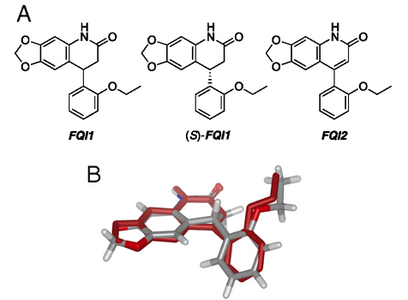Collaborative Research Discovers New Approach in the Treatment of Liver Cancer

Until now, there has been no effective, systemic treatment for liver cancer (hepatocellular carcinoma), the fifth most common cancer worldwide. Writing in the Proceedings of the National Academy of Science (PNAS), Professor Scott Schaus (Chemistry) and Professor Ulla Hansen (Biology and Molecular Biology, Cell Biology & Biochemistry) have reported their discovery of a new protein target for chemotherapy in the treatment of liver cancer — the transcription factor LSF. LSF occurs at high levels in the tumor tissue of patients with liver cancer and is known to promote the development of cancer (oncogenesis) in studies using laboratory rodents.
The co-investigators have identified small molecules that effectively inhibit LSF cellular activity, which in turn slows the growth of the cancer. In particular, they found that one such molecule, Factor Quinolinone Inhibitor 1 (FQI1), derived from a lead compound, inhibits the ability of LSF to bind DNA both in extracts (in vitro, as determined by electrophoretic mobility shift assays) and in cells. Consistent with inhibiting LSF activity, FQI1 also eliminates the ability of LSF to turn up transcription. While FQI1 quickly causes cell death in LSF-overexpressing cells, including liver cancer cells, healthy cells are unaffected by the treatment. This phenomenon has been called oncogene addiction, where tumor cells are “addicted” to the activity of an oncogenic factor for their survival, but normal cells can do without it. This characteristic is very encouraging for use
of such compounds clinically.

Following in vitro trials, the researchers tested the efficacy of FQI1 in inhibiting liver cancer tumor growth by injecting HCC cell lines into rodent models. FQI1 was observed to significantly inhibit tumor growth with no observable side effects (general tissue cytotoxicity). These dramatic findings support the further development of LSF inhibitors as a promising new chemotherapy treatment for liver cancer.
This work is featured as part of the series, “BU Takes on Cancer,” in BU Today (April 11, 2012).
Citation: T.J. Grant, J. A. Bishop, L.M. Christadore, G. Barot, H.G. Chin, S. Woodson, J. Kavouris, A. Siddiq, R. Gedler, X-N. Shen, J. Sherman, T. Meehan, K. Fitzgerald, S. Pradhan, L.A. Briggs, W.H. Andrews, D. Sarkar, S.E. Schaus, and U. Hansen, “Antiproliferative small-molecule inhibitors of transcription factor LSF reveal oncogene addiction to LSF in hepatocellular carcinoma,” Proc. Natl. Acad. Sci. U.S.A., March 20, 2012, Vol. 109, No. 12, 4503-4508.